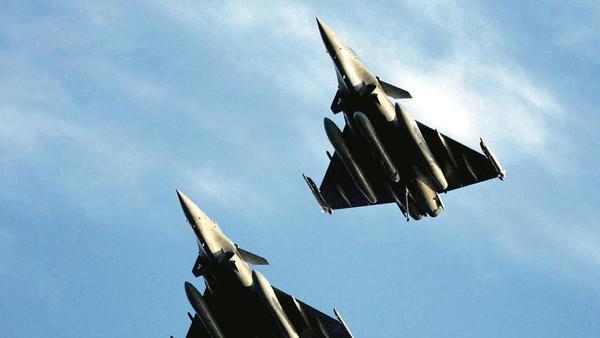SC Dismisses Centre's Preliminary Objections Against Relying On "Privileged" Documents, Review To Be Heard On Merits

Image Courtesy: Livemint
The Supreme Court today dismissed the preliminary objections raised by the Centre against using privileged documents for considering the review petitions in the Rafale case. The Court said that the review petitions will be heard on merits and a date will be fixed for that.
Justice K M Joseph wrote a separate judgement concurring with CJI Gogoi and Justice S K Kaul. On March 14, the bench of Chief Justice Ranjan Gogoi and Justices Sanjay Kishan Kaul and KM Joseph had reserved the orders on the preliminary issue, whether the Court can look into the documents presented by the petitioners.
The petitioners had sought for a review of the December 14 judgment dismissing the plea for probe into the corruption allegations in the Rafale deal by relying on reports published by The Hindu.
The Attorney General objected to reliance of these documents by saying that they were 'stolen' from the Ministry of Defence, and said that they were protected by 'privilege' under Section 123 of the Indian Evidence Act. The AG further said that documents are protected under the Official Secrets Act and that the disclosure of the documents is exempted under the Right to Information Act as per Section 8(1)(a).
Also Read: Rafale Case: How The AG Scored a Self-Goal on Modi Sarkar
Prashant Bhushan, one of the petitioners, had countered the submissions of AG by saying that claim of privilege cannot be made over documents which are already in public domain. He highlighted that Section 123 Indian Evidence Act only protected "unpublished documents". Further, he said that journalistic privilege to protect sources is recognised by the Press Council of India Act as per Section 15.
He also referred to the orders passed by the SC in 2G and coal block cases, whereby the visitors book registers of former Central Bureau of Investigation director Ranjit Sinha were accepted as evidence without insisting on revealing how they were obtained. He had also referred to the "Pentagon Papers Case", to say that US SC allowed publication of documents though they were related to Vietnam War. "The concern of the government is not to protect national security, but to protect the government officials who interfered with the negotiations in the deal,” he said.
Arun Shourie, another petitioner remarked that he was thankful to the AG for admitting that the documents were genuine by stating that they were photocopies. The Court was hearing the review petitions filed by Prashant Bhushan, Yashwant Sinha and Arun Shourie against the December 14 judgement. Listed along with the review petition were the correction petition filed by the Central Government and the petition filed for initiating perjury proceedings against officials who allegedly misled the Court by submitting false information in the notes submitted to the Court.
Adding to misery, N. Ram of ‘The Hindu’ released yet another report on April 9 stating that the Cabinet Committee on Security (CCS) headed by Prime Minister Narendra Modi gave exceptional and unprecedented waivers to M/s Dassault Aviation and M/s MBDA in the offset contracts they signed with the Indian government on September 23, 2016, as part of the €7.87 billion Rafale deal.
“These waivers, granted on August 24, 2016, at the highest level of political decision-making, were exemptions given to the two private French companies from having to comply with provisions of the Standard Contract Document of the Defence Procurement Procedure, DPP-2013,” the report stated.
Also Read: Rafale Deal: The Big Difference With Bofors is Nobody Has Found Money Trail Yet: N Ram
The reported waivers concerned two key issues — the provisions to be made in the offset contracts for arbitration (Article 9) and access to books of accounts of the industrial suppliers (Article 12), which had been sent up to the CCS for its “final review and approval” by the Defence Acquisition Council (DAC) headed by Defence Minister Manohar Parrikar. He had evidently felt uncomfortable with sanctioning, at his level, major deviations from the Defence Procurement Procedure. But that was not all.
The article also mentioned that two other mandated provisions of DPP-2013 that prohibit the “Use of Undue Influence” and “Agents/ Agency Commission”, Articles 22 and 23, respectively, of the Standard Contract Document, and provide for penalties against private industrial suppliers in case of transgressions, had been quietly dropped along the way by the DAC. Curiously, while the deletion of these vital integrity provisions from the Supply Protocols, which were themselves only annexures to the Inter-Governmental Agreement (IGA), went up to the CCS for “final review and approval”, their deletion from the offset contracts, which had been insisted on by the French industrial suppliers, did not have to.
“These salient facts, which were not disclosed by the government in its submissions to the Supreme Court of India, as well as other aspects of an open-ended and murky set of offset arrangements which were enabled by a major change in offset policy in August 2015, come to light in the final report of the Indian Negotiating Team (INT), dated July 21, 2016, to which The Hindu has access,” the report concluded.
With additional inputs from The Hindu. Read the full report here.
Get the latest reports & analysis with people's perspective on Protests, movements & deep analytical videos, discussions of the current affairs in your Telegram app. Subscribe to NewsClick's Telegram channel & get Real-Time updates on stories, as they get published on our website.






















